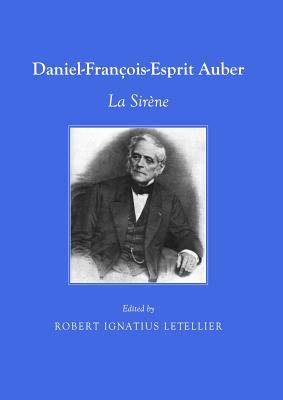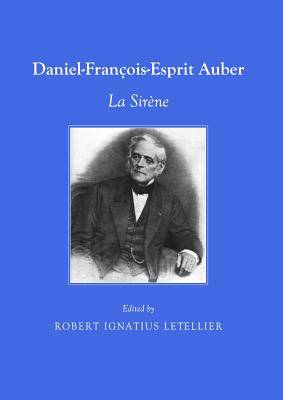
- Retrait gratuit dans votre magasin Club
- 7.000.000 titres dans notre catalogue
- Payer en toute sécurité
- Toujours un magasin près de chez vous
- Retrait gratuit dans votre magasin Club
- 7.000.0000 titres dans notre catalogue
- Payer en toute sécurité
- Toujours un magasin près de chez vous
99,95 €
+ 199 points
Description
Daniel-Francois-Esprit Auber (1782-1871) was long considered one of the most typically French as well as one of the most successful of the opera composers of the 19th century. Although musically gifted, he initially chose commerce as a career, but soon realized that his future lay in music. He studied under Cherubini, and it was not long before his opera-comique La Bergere Chateleine (1820), written at the age of 38, established him as an operatic composer. Perhaps the greatest turning point in Auber's life was his meeting with the librettist Eugene Scribe (1791-1861), with whom he developed a long and illustrious working partnership that ended only with Scribe's death. Success followed success; works such as Le Macon (1825) and La Muette de Portici (1828) brought Auber public fame and official recognition. In 1829 he was appointed a member of the Institut, in 1839 Director of Concerts at Court, in 1842 Director of the Conservatoire, in 1852 Musical Director of the Imperial Chapel, and in 1861 Grand Officer of the Legion d'Honneur. Auber seems to have been fated to live in revolutionary times; during his long life no less than four revolutions took place in France (1789, 1830, 1848, 1870). Auber's famous historical grand opera La Muette de Portici (also known by its hero's name as Masaniello) is perhaps unsurprisingly based on revolution, depicting the 1647 Neapolitan uprising against Spanish rule. It is a key work in operatic history, and has a revolutionary history itself: it was a performance of this work in Brussels in 1830 that helped spark the revolution that led to the separation of Belgium from Holland. It was a revolution that hastened Auber's death at the old age of 89. He died on 12 May 1871 as a result of a long illness aggravated by the privations and dangers of the Siege of Paris. He had refused to leave the city he had always loved, even after his house had been set on fire by the petroleurs et petroleuses. In a twist of fate, a mark had been placed on the house of the composer of Masaniello, the very voice of Romantic liberty! Auber's overtures were once instantly recognizable, favourites of the light Classical repertoire. His gracious melodies and dance rhythms had a huge influence, both on piano and instrumental music, and on the genre of Romantic comic opera, especially in Germany. Musical tastes and fashions have changed, and contemporary audiences are more accustomed to the heavier fare of verismo, Wagnerian transcendentalism, and 20th-century experimentalism. The operas themselves, apart from Fra Diavolo (1830), are seldom performed, yet Auber's elegant, delicate and restrained art remains as appealing to the discerning listener as ever it was. La Sirene, an opera-comique in three acts, with libretto by Eugene Scribe, was first performed at the Opera-Comique (Deuxieme Salle Favart) on 26 March 1844. The scene is laid in the Abruzzi, during the Restoration. Three travellers, the operatic impresario Bolbaya, his aged servant Mathea and the naval ensign Scipion, are caught up in Romantic adventures in the mountains as they hear in the distance the entrancing song of the Siren, who lures unwary travellers to an ambush laid by her brother, the bandit chief Marco Tempesta (disguised as the innkeeper Scopetto). The bandits' ship has been captured, but Scopetto has a plan to smuggle their contraband through the Duke of Popoli's estate, using Bolbaya's troupe as a front. Zerlina, the Siren, reveals she has fallen in love with Scipion. After further intrigue, papers are produced revealing that Scipion is the rightful Duke of Popoli and that Scopetto is his cousin. The smugglers of this opera provide a variant on Scribe's popular robber motif. Apart from his villainous profession, Marco Tempesta has a generous soul; he forgives his enemies, marries his sister to the young naval officer who has captured the fortune of the smugglers, and, having made them happy, escapes by opportune evasion and witty revelation of his true identity. The dialogue is agreeable, and the episodes ingenious. The music in its style and character belongs to Auber's third period. There is an expansiveness in the melodic phrases and a sensibility that speaks more powerfully than in the earlier works, with a preponderance of florid writing, especially in the finales of acts 2 and 3. Act 1 contains the couplets O chef des flibustiers which becomes a recurring motif throughout the work, appearing as solo, trio and duet. The central duet of the opera is realized in terms of a waltz modality, another form that recurs throughout the opera. Act 3 is structured by the recurring chorus Les chagrins arriere, another scene between brother and sister, the denouement of the imbroglio and the vocalise of the prima donna. The original cast consisted of: Gustave-Hippolyte Roger (Scopetto), Louise Lavoye (Zerlina), Marius-Pierre Audran (Scipion), Ricquier (the Duke of Popoli), Henri (Bolbaya), Genevieve-Aimee-Zoe Prevost (Mathea), and Charles-Francois Duvernoy (Pecchione). The work remained in the repertoire until 1887, numbering 164 performances, and was translated into German, English, Polish, Swedish and Russian. In the Americas it was performed in New Orleans (1845), New York and Buenos Aires (both in1854).
Spécifications
Parties prenantes
- Auteur(s) :
- Editeur:
Contenu
- Nombre de pages :
- 199
- Langue:
- Anglais
Caractéristiques
- EAN:
- 9781443828949
- Date de parution :
- 01-05-11
- Format:
- Livre broché
- Format numérique:
- Trade paperback (VS)

Les avis
Nous publions uniquement les avis qui respectent les conditions requises. Consultez nos conditions pour les avis.






